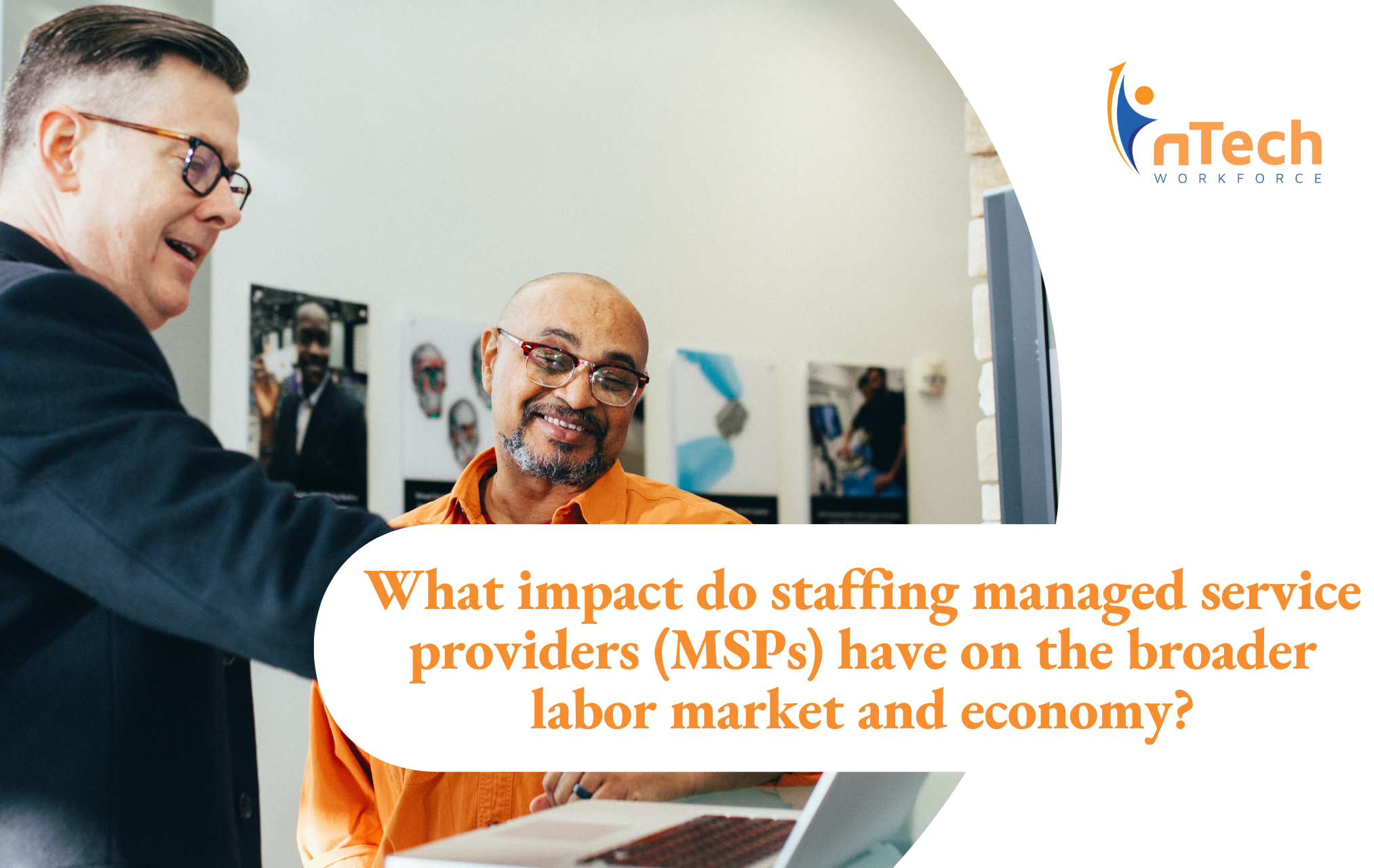What Are Common Challenges Businesses Face When Working With an MSP? How Can They Be Mitigated?
In this edition of nSider, Arthur Ransier, Director of Business Strategy at nTech Workforce, sheds light on the intricacies of collaborating with a ...
7 min read
![]() nTech Workforce
:
Jan 12, 2023 10:00:00 AM
nTech Workforce
:
Jan 12, 2023 10:00:00 AM

MSPs play a significant role in providing contingent workers to companies across various industries. Their impact on the broader labor market and economy can help policymakers, businesses, and workers themselves make more informed decisions.
For example, some may argue that the use of MSPs can lead to greater flexibility and efficiency in the labor market, while others may argue that it can lead to a more precarious and uncertain employment environment for workers. By considering this question, stakeholders can better understand the implications of MSPs on the labor market and the economy as a whole.
According to Arthur Ransier, Director of Business Strategy at nTech Workforce, “MSPs play a critical role in managing contingent workers, and it’s crucial to ensure that workers are treated fairly and ethically. The policies and practices of MSPs regarding pay, benefits, working conditions, and other employment aspects have a significant impact on the lives of contingent workers and their families. Businesses and organizations need to work with MSPs that prioritize the well-being of their workforce and community.”
To ensure that their contingent workers are treated fairly and ethically, MSPs take various measures. These measures include conducting regular audits and assessments of their clients' workplaces to ensure compliance with labor laws and regulations. MSPs may also have their policies and procedures to ensure that their clients provide fair compensation, benefits, and working conditions to their contingent workers. Additionally, MSPs may provide training and support to their contingent workers, empowering them to speak up if they feel that they are being treated unfairly.
MSPs may partner with organizations that share their commitment to fair and ethical treatment of contingent workers. For example, they may partner with labor unions or other worker advocacy groups to negotiate on behalf of their contingent workers and ensure that they receive fair compensation and benefits. MSPs may also work with certification bodies or industry associations that promote ethical labor practices to ensure that they meet the highest standards in their industry. Additionally, MSPs use technology and data analytics to monitor and measure their clients' compliance with fair labor practices. They may use software platforms to track workers' hours, wages, and benefits to ensure that they are being paid fairly and accurately. By taking these measures, MSPs can ensure that their clients provide fair and ethical treatment to their contingent workers, contributing to a better working environment for all.
Staffing Managed Service Providers (MSPs) are typically responsible for managing contingent workers, which may include contractors, freelancers, and other temporary employees. As such, their role in labor relations may vary depending on the specific circumstances and the type of worker being managed. MSPs may participate in labor relations in various circumstances depending on the outlined scope of work in an agreement with the particular client:
MSPs negotiate contracts with their clients (the companies that require contingent workers) on behalf of the workers. This negotiation may include discussions about compensation, benefits, and working conditions, among other things.
MSPs must ensure that they and their clients comply with labor laws and regulations. This includes laws related to minimum wage, overtime, working hours, and workplace safety, among others.
MSPs may be involved in resolving disputes between the client and the workers. This may include grievances related to pay, benefits, or working conditions.
In some cases, MSPs may work with unions to negotiate collective bargaining agreements on behalf of the workers.
According to Ransier, “... the specific role of an MSP in labor relations may depend on the terms of the contract between the MSP and the client.” MSPs are subject to the laws and regulations which apply to the particular situation.
MSPs can affect wages and benefits for contingent workers in various ways, and these effects can have a significant impact on the broader labor market. For example, MSPs may negotiate higher wages and better benefits on behalf of their contingent workers, which can increase the overall compensation for these workers.
However, MSPs may also place downward pressure on wages and benefits for contingent workers if they prioritize cost savings over fair compensation. MSPs may achieve cost savings by leveraging economies of scale, negotiating lower wages, or reducing benefits packages for contingent workers. This can create a race-to-the-bottom effect, where employers may feel pressure to reduce wages and benefits to remain competitive with other businesses using MSPs.
The impact of MSPs on wages and benefits for contingent workers can be both positive and negative, and their effects on the broader labor market depend on how MSPs balance cost savings with fair compensation for their contingent workers.
MSPs can play a significant role in shaping industry standards and labor laws through their interactions with clients and engagement in industry associations and policy-making organizations. MSPs may advocate for policies that benefit their clients and contingent workers, such as fair pay and working conditions, but may also push for deregulation or policies that benefit their business interests.
The impact of MSPs on industry standards and labor laws can have a profound effect on the broader economy. If MSPs advocate for policies that prioritize cost savings over fair compensation and working conditions, this can lead to a decline in overall job quality and increase income inequality. On the other hand, if MSPs prioritize fair compensation and working conditions, this can lead to increased economic stability, job satisfaction, and productivity.
Furthermore, the use of MSPs can also lead to increased labor market flexibility, allowing businesses to adapt more easily to changing economic conditions and respond to fluctuations in demand for workers. This can result in increased economic growth and job creation.
However, the use of MSPs may also contribute to the erosion of worker protections and labor standards, particularly if MSPs engage in unethical practices, such as misclassification of workers, wage theft, or other labor violations. This can lead to negative economic and social consequences, such as increased poverty, reduced consumer spending, and decreased worker productivity.
Ransier adds, “The role of MSPs in shaping industry standards and labor laws can have far-reaching consequences for the broader economy, so it’s important to ensure that MSPs prioritize fair compensation and working conditions for contingent workers while also supporting economic growth and job creation.”
The economic implications of MSPs on workforce productivity, innovation, and competitiveness can be complex and multifaceted. On one hand, the use of MSPs can help businesses access a more flexible and agile workforce, which can enhance productivity and innovation by allowing them to quickly adapt to changing market conditions and access specialized skills as needed.
MSPs can also facilitate the use of new technologies and innovations in the workplace, as they can provide businesses with access to workers with specialized skills and expertise that might not be available in-house. This can help businesses to remain competitive in a rapidly changing economic landscape and spur new growth and development.
However, the use of MSPs can also have negative economic implications if they are used to undermine worker protections or erode labor standards. For example, if MSPs engage in practices such as misclassifying workers or failing to provide fair compensation and working conditions, this can lead to reduced worker productivity and decreased morale, which can ultimately harm a business's bottom line and competitiveness. Furthermore, the use of an MSP may lead to an increased supply and competition for jobs, which may reduce the bargaining power of workers.
The economic implications of MSPs on workforce productivity, innovation, and competitiveness are highly dependent on the specific policies and practices of MSPs and their clients. While the use of MSPs can provide businesses with important benefits, it is important to ensure that they are used ethically and in a way that supports fair compensation, worker protection, and sustainable economic growth.
The changes in demand for contingent workers and MSP services can have significant impacts on job growth and economic stability in different industries and regions.
In industries where the use of contingent workers and MSP services is more prevalent, such as the gig economy or technology sector, fluctuations in demand for these services can have a significant impact on overall job growth and economic stability. For example, if demand for contingent workers and MSP services decreases, this can lead to job losses and decreased economic activity in these industries, which can in turn have ripple effects throughout the broader economy.
Similarly, changes in demand for contingent workers and MSP services can impact economic stability in different regions. Regions with a high concentration of industries that rely heavily on contingent workers and MSP services, such as technology hubs or areas with a large gig economy, may be more vulnerable to fluctuations in demand for these services. In these regions, a decrease in demand for contingent workers and MSP services can lead to job losses and decreased economic activity, which can have negative impacts on the overall economic stability of the region.
Conversely, regions that have a more diverse mix of industries may be less vulnerable to fluctuations in demand for contingent workers and MSP services. In these regions, a decrease in demand for these services may be offset by growth in other sectors, which can help to mitigate the impact on overall job growth and economic stability.
The impact of changes in demand for contingent workers and MSP services on job growth and economic stability will depend on a range of factors, including the industries and regions in question, as well as broader economic trends and conditions.
MSPs typically fill a range of jobs that fall under the umbrella of contingent or temporary work. These can include positions such as seasonal workers, freelancers, contractors, and project-based employees. Some examples of jobs that MSPs may fill include administrative assistants, warehouse workers, customer service representatives, and IT professionals.
One of the key ways in which these jobs differ from traditional full-time employment is like the work itself. Contingent workers often work on a project-by-project basis, and may not have the same level of job security or benefits as traditional full-time employees. In some cases, contingent workers may not receive benefits such as health insurance or retirement plans, and may not be eligible for paid time off or other benefits.
Another key difference between contingent work and traditional full-time employment is the relationship between the worker and the employer. Ransier says, “Contingent workers are employed by a staffing company rather than the company where they are working.” The MSP is responsible for establishing standards, and compliance with those standards, across their supply chain to ensure staffing companies are effectively managing the worker's employment relationship, including issues such as pay, benefits, and compliance with labor laws and regulations.
Ransier continues, “Contingent workers also tend to have more flexibility and autonomy in their work than traditional full-time employees. This can be a benefit and a challenge, as it allows workers to structure their work in a way that suits their individual needs and preferences, but may also lead to uncertainty or instability in terms of job security or income.”
The types of jobs that MSPs fill tend to be more flexible and project-based than traditional full-time employment, and may offer both benefits and challenges for workers seeking employment in these fields.
nTech Workforce is deeply invested in the success of our community and strives to improve access to meaningful work, giving the local workforce opportunities to thrive. We are adept at converting project plans into hiring plans and partnering with clients to get work done. Our Managed Staffing & Labor Services offer opportunities for workforce flexibility, risk management, strategic workforce planning, talent acquisition & retention, and long-term ROI.

In this edition of nSider, Arthur Ransier, Director of Business Strategy at nTech Workforce, sheds light on the intricacies of collaborating with a ...

According to a report by the Global Wind Energy Council, 2023 will be the first year in which global new capacity for offshore wind will exceed 100...

Change is an inevitable part of business. That means there is no excuse for being caught off guard. By gathering information on an ongoing basis,...